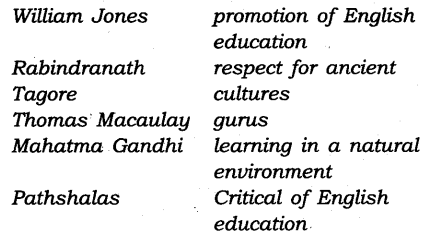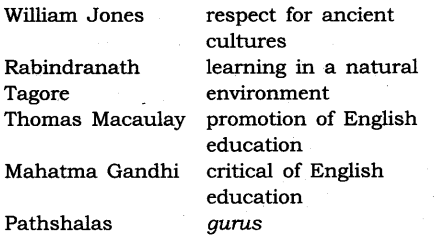CBSE CLASS 10 BOARD 2024 ALL IMPORTANT QUESTIONS

class6,class7,class8,class9,class10,class11,class12,government jobs news,cbse update news,jobs,competition exams,india news,news update,tech news,health news,mcq questions,question answer in hindi ,question answer in english,short answer type questions,very short answer type questions,product reviews,current affairs update news ,travel blog ,education news ,govt vacancy,competition exams notification,saraswati tuition centre,exam notes,maths concept,reasoning ,exam syllabus,ncert ,practice paper

Question 2.
State whether true or false
Answer:
Question 3.
Why did William Jones feel the need to study Indian history, philosophy and law?
Answer:
by phani
NCERT Solutions for Class 8 Social Science History Chapter 8 Civilising the “Native”, Educating the Nation
NCERT Solutions for Class 8 Social Science History Chapter 8 Civilising the “Native”, Educating the Nation
Question 1.
Match the following:
Answer:
Question 2.
State whether true or false
Answer:
Question 3.
Why did William Jones feel the need to study Indian history, philosophy and law?
Answer:
Question 4.
Why did James Mill and Thomas Macaulay think that European education was essential in India?
Answer:
Question 5.
Why did Mahatma Gandhi want to teach children handicrafts?
Answer:
Mahatma Gandhi wanted to teach children handicraft because of the following reasons:
Question 6.
Why did Mahatma Gandhi think that English education had enslaved Indians?
Answer:
Choose the correct answer:
Question 1.
William Jones was a linguist because
(a) he had studied Greek and Latin
(b) he knew French and English
(c) he had learnt Persian
(d) all of these
Answer: (d) all of these
Question 2.
Who set up Asiatic Society of Bengal?
(a) William Jones
(b) Henry Thomas Colebrooke
(c) Nathaniel Halhed
(d) All of these
Answer: (d) All of these
Question 3.
Madrasa was set up ip, Calcutta in the year
(a) 1750
(b) 1761
(c) 1771
(d) 1781
Answer: (d) 1781
Question 4.
According to whom, “English education had enslaved Indians”?
(a) Rabindranath Tagore
(b) Mahatma Gandhi
(c) Subhas Chandra Bose
(d) Aacharya Vinoba Bhave
Answer: (b) Mahatma Gandhi
Question 5.
The Education Act was introduced in the year
(a) 1850
(b) 1835
(c) 1910
(d) 1900
Answer: (b) 1835
Question 6.
Asiatick Researches (Journal) was NOT started by
(a) William jones
(b) Henry Thomas Colebrooke
(c) Nathaniel Halhed
(d) William Carey
Answer: (d) William Carey
Question 7.
Study of which of the following was NOT the purpose of setting up Madrasa in Calcutta in 1781?
(a) Arabic
(b) Sanskrit
(c) Persian
(d) Islamic laws
Answer: (b) Sanskrit
Question 8.
Who was Charles Wood?
(а) The President of the Board of Control of the Company
(b) e Commissioner of the Board of Control of the Company
(c) An Educationist
(d) Nonp of the above
Answer: (а) The President of the Board of Control of the Company
Question 9.
The English Education Act was passed
(a) to materialise Macaulay’s thinking
(b) to make the English the medium of instruction for higher education
(c) to stop the promotion of oriental institutions
(d) all of the above
Answer: (d) all of the above
Question 10.
What type of school did Tagore want to set up?
(a) Where the child was happy
(b) Where he/she could be free and creative
(c) He/she was able to explore her own thoughts and desire
(d) All of the above
Answer: (d) All of the above
Question 11.
Who said these “Education means all round drawing out of the best in child and man- body, mind and spirit”?
(a) Rabindranath Tagore
(b) Mahatma Gandhi
(c) Swami Dayanand Saraswati
(d) None of these
Answer: (b) Mahatma Gandhi
Match the following:
| Column A | Column B |
| (i) Linguist | (a) A person who can read, write and teach persian. |
| (ii) Orientalists | (b) A local language. |
| (iii) Munshi | (c) A place of learning. |
| (iv) Vernacular | (d) An order brought from England to India by Wood. |
| (v) Wood’s Despatch | (e) A person who knows and studies several languages. |
| (vi) Pathshalas | (f) People who have scholarly knowledge of the language and culture of Asia. |
Answer:
| Column A | Column B |
| (i) Linguist | (e) A person who knows and studies several languages. |
| (ii) Orientalists | (f) People who have scholarly knowledge of the language and culture of Asia. |
| (iii) Munshi | (a) A person who can read, write and teach persian. |
| (iv) Vernacular | (b) A local language. |
| (v) Wood’s Despatch | (d) An order brought from England to India by Wood. |
| (vi) Pathshalas | (c) A place of learning. |
State whether true or false:
1. Mahatma Gandhi was the promotor of English language.
Answer: False
2. William Jones had a respect for ancient cultures.
Answer: True
3. Thomas Macaulay thought that European education was necessary in India.
Answer: True
4. William Carey had an appointment as a Supreme Court Judge.
Answer: False
5. Hindu College was set up at Banaras to encourage the study of ancient Hindi texts,
Answer: False
6. William Adam was a Scottish missionary.
Answer: True
Fill in the blanks:
1. Mahatma Gandhi favoured ………………….. languages as a medium of instruction.
Answer: Indian
2. Williani Jones had ………………….. for Indian ancient cultures.
Answer: respect
3. Charles Wood emphasised the practical benefits of a system of ………………….. learnings.
Answer: European
4. ………………….. started the Santiniketan in 1901.
Answer: Rabindra Nath Tagore
5. According to Adam’s report there were over 1 lakh ………………….. in Bengal and Bihar.
Answer: Pathshalas
Question 1.
Define the term linguist.
Answer:
Linguist is someone who knows and studies several languages.
Question 2.
What was main aim behind establishing Hindu College in Benaras in 1791?
Answer:
Hindu College was established to encourage the study of ancient Sanskrit texts that would be useful for the administration of the country.
Question 3.
What is meant by an Orientalist?
Answer:
Orientalists were those who were having scholarly knowledge of the language and culture of Asia.
Question 4.
How did Thomas Babington Macaulay see India?
Answer:
He saw India as an uncivilized country that needed to be civilized.
Question 5.
Why was the English Education Act introduced and in which year?
Answer:
Following Macaulay’s minute, the English Education Act of 1835 was introduced.
Question 6.
Who toured the districts of Bengal and Bihar in 1830’s?
Answer:
In 1830’s William Adam, a Scottish missionary toured the districts of Bengal and Bihar.
Question 7.
When did the Company decide about improving the system of vernacular education?
Answer:
After 1854, the Company decided to improve the system of vernacular education.
Question 8.
Name the institution established by Rabindranath Tagore.
Answer:
‘Santiniketan’ was established by Rabindranath Tagore in 1901.
Question 9.
Who was William John.
Answer:
William Jones was appointed as Junior Judge at the supreme court of company.
Question 10.
Which languages were learnt by William Jones?
Answer:
Greek, Latin, French and English.
Question 11.
By whom was the Asiatic society of Bengal was setup?
Answer:
By William Jones.
Question 12.
From whom did William Johns learnt Sanskrit language?
Answer:
The Pandits.
Question 13.
In which year was Madarsa setup in Calcutta?
Answer:
In 1781.
Question 14.
When was the Hindu college Benaras was established?
Answer:
In 1791.
Question 15.
Who emphasized on teaching of English language in manner of civilizing, changing the taste values and cultures of the Indians?
Answer:
Lord Macaulay.
Question 16.
When was the English Education act introduced?
Answer:
In 1835.
Question 17.
Who was William Carey.
Answer:
William Carey was a Scottish missionary.
HOPE YOU LIKE ALL THESE IMPORTANT QUESTIONS .............
Comments
Post a Comment